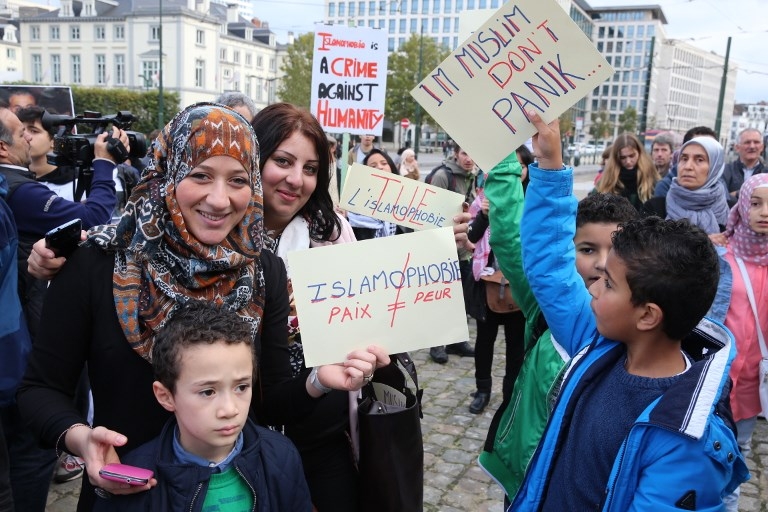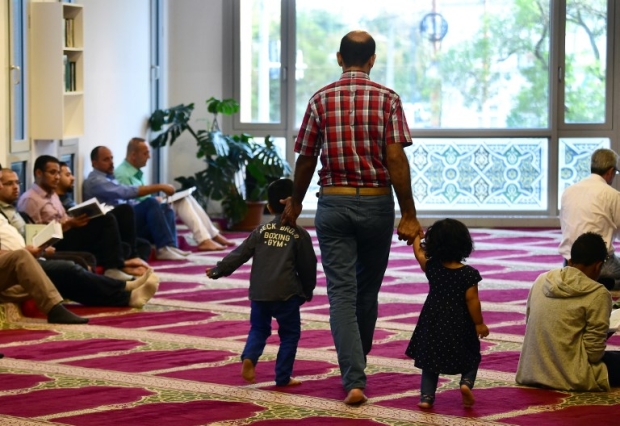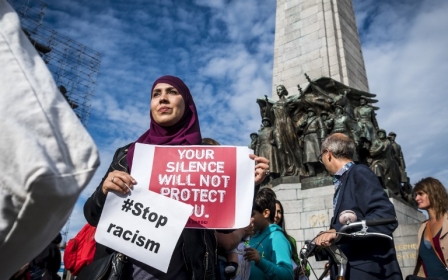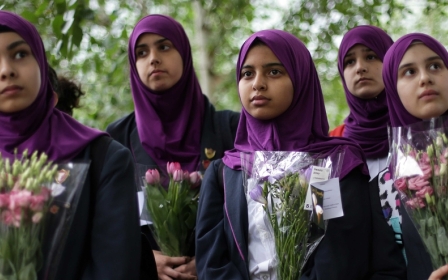Muslims in Europe facing 'hostility in everyday life', Islamophobia study finds

BRUSSELS - European academics and policy makers came together at the European Parliament in Brussels on Wednesday to launch what they describe as a "toolkit" to tackle Islamophobia across the continent.
The report, based on research in eight countries including the UK, France and Germany, said it had identified a "worsening environment of Islamophobia" in which Muslims faced a "new and acceptable hostility... in many spheres of everyday life".
“This is an issue that is poisoning our societies in the European Union and putting barriers between our communities,” said Jean Lambert, a Green Party member of the European Parliament (MEP) representing London, during the opening of the conference in Belgium.
Long present across the continent, the report highlights how Islamophobia has been further bolstered in the past decade, tied to the rise of far-right and anti-immigration movements in many European countries, the “War on Terror” both within and outside Europe, and the refugee crisis.
Recent examples included former British foreign secretary Boris Johnson's newspaper column last month in which he compared niqab-wearing women to 'letter boxes'.
In France, a veiled student union leader was publicly chastised for a televised appearance and caricatured as a monkey by a prominent satirical outlet; in Germany, stories in the media about alleged roving bands of rapist refugees stoked panic; while several countries across Europe have passed so called "burqa bans", restricting the wearing of niqabs and Muslim veils in public spaces.
While countering such a wave of xenophobia and racism towards Muslim citizens and residents of Europe might seem like a herculean task, the authors of the “Counter Islamophobia Kit” briefing paper say it is a necessity.
The UK used to pride itself in its diversity, but that discourse is no longer there
- Arzu Merali, head researcher for the Islamic Human Rights Commission (IHRC)
“A worsening environment of Islamophobia was identified with respect to media content, political discourse and experiences of discrimination indicating the new and increasingly acceptable hostility against Muslims in many spheres of everyday life,” the report warned.
European academics led by the University of Leeds, in conjunction with NGOs and activists, explored the various drivers of Islamophobia in eight European countries - the United Kingdom, France, Belgium, Germany, Czech Republic, Greece, Hungary and Portugal - as well as the efforts to foster counter-narratives to Islamophobia in each country.
"The project has revealed the vast expansiveness of Islamophobia, the fact that it permeates so many elements of our lives and of society," Amina Easat-Daas, project officer for the Counter Islamophobia Kit, told Middle East Eye.
"We want to challenge the narratives that exist, to contextualise them and emphasise their normalcy, their everyday nature, and also highlight the brilliant contributions many Muslims are making in society. "
Local variations of Islamophobia
While Islamophobia in most countries was strongly associated with the perception of Muslims constituting a “threat to security” and “a threat to local, national and European identity”, local culture and history has informed the way Islamophobia has been formulated.
While there is ample documentation of France’s instrumentalisation of its national conception of laïcité - secularism - to target its Muslim citizens for being visibly unsecular, in Portugal, the history of the reconquest of the Iberian Peninsula from the Moors in the Middle Ages has fed local narratives of civilisational struggle and fears of a Muslim "invasion".
In Greece, the report said, some Islamophobic discourses raised the spectre of Turkey using refugees to expand its control across the Aegean - as refugees and Muslims become conflated identities in the public psyche.
Meanwhile, in countries such as Hungary that have served as a transit point for many asylum seekers attempting to reach western Europe, the narrative of Muslim as potential terrorists remain strong, with Prime Minister Viktor Orban telling Germany's Bild newspaper: "We don't see these people as Muslim refugees. We see them as Muslim invaders."
Yet the most publicised recent "terrorism" conviction in the country involved an asylum seeker prosecuted earlier this month for throwing stones at police officers.
Even in countries like the United Kingdom, which have a long history of diversity, long-standing Muslim populations find themselves the target of hatred in the wake of attacks claimed by Islamic State group.
There is an urgent need to recognise Islamophobia as a form of racism
- Luis Manuel Hernandez Aguilar, German researcher
“The UK used to pride itself in its diversity, but that discourse is no longer there,” said Arzu Merali, the head researcher for the Islamic Human Rights Commission (IHRC) in the UK, during Wednesday's conference, describing how a generalised discourse targeting Muslims in schools or streets also culminates in “targeted legislation” which solidifies “the idea of Muslims as non-citizens”.
“It sounds pretty dramatic, but this is the kind of scenario we are facing in the UK today,” Merali said.
“There is an urgent need to recognise Islamophobia as a form of racism,” Luis Manuel Hernandez Aguilar, IHRC researcher in Germany said during Wednesday's conference, pointing to “how easily Islamophobia moves between everyday life and politics” when Islamophobia “is not officially recognised as a form of discrimination”.
In Germany, Aguilar said, racist tropes have enforced the idea that “being a Muslim means being a problem”.
While Easat-Daas highlighted the differences between each country in the study, she expressed concern about France's status as a "barometer" - and trailblazer - of Islamophobia in Europe.
"I worry that (France) is a potential leader, that it signposts that this is acceptable. Its laws set precedence, I worry that French policies set precedence," she told MEE. "When you see the French ‘loi anti-niqab’ and how that then plays out in different framings, in Belgium first, and then further and further, I’m worried that it’s gaining credence and an image of legitimacy."
Countering toxic narratives
In the face of mounting hateful discourse and actions promoted by public figures, media, and ordinary citizens, sometimes with deadly consequences, the Counter Islamophobia Toolkit highlights initiatives that seek to counter prevalent toxic narratives about Islam.
The report cast some doubts on the effectiveness of reactive condemnations of attacks committed by Muslim individuals and efforts to distance them from the broader Muslim community as still falling within a narrative of “securitisation” of Muslims in all aspects of their lives, and fostering the expectation that all Muslims must condemn any negative acts committed by one of their co-religionists.
Many efforts across the continent have sought to demystify Islam to non-Muslim European citizens, such as the Parle-moi d’Islam videos explaining aspects of the religion.
Key to combating Islamophobia, the report says, is the "normalisation" of Muslims - showing them as individuals with the same lives and aspirations as others, as in the Human Library in the Czech Republic, and highlighting food, fashion and culture as points of human connection between Muslims and non-Muslims.
In some cases, approaches to fight Islamophobia might appear counter-intuitive - as in Greece, where some efforts actually leaned on prevailing Christianity in the Mediterranean country to promote “Conservative anti-nationalist narratives and Christian ecumenical ideals such as peace, hospitality and care towards the vulnerable, especially towards refugees”.
Part of the efforts to counter Islamophobia, Easat-Daas said, include recognising the phenomenon as not simply exclusive to right-wing movements.
"I would argue that (Islamophobia) is not exclusive to the right wing, but rather something that you can see across the political spectrum," she said. "It shouldn’t be acceptable political discourse to stigmatise or to speak on behalf of other people - which is often something we see in liberal Islamophobia."
Legal shortfalls
While the burden of fighting against Islamophobia seems to mainly fall on the shoulders of civil society in Europe as hateful discourse has become further normalised in the political and governmental sphere, the report highlights the role played by the European legal system - and its shortfalls.
“There is limited engagement of European human rights law with the best legal practices to counter Islamophobia in individual EU member states,” the report reads. “As a result, the forms that both judicial intervention and legal measures, including positive measures, could take in order to effectively counter Islamophobia remain unclear.”
The report goes on to criticise the European Court of Human Rights for its “rigidity” in ruling on cases of alleged state Islamophobia which it said had shifted “the burden of proof away from the state and onto the applicants who should then prove that the restrictions against their right to freedom of religion are disproportionate”.
The brief nonetheless welcomed efforts by the Parliamentary Assembly of the Council of Europe in passing a number of non-binding resolutions analysing and defining Islamophobia, highlighting it as a necessary step towards tackling the problem.
Islamophobia is a challenge to the continuation of a particular type of European democratic project, and that’s why I think it should be taken seriously, and not just in relation to the defense of Muslim communities, but in defence of the kind of world we want to live in
- Salman Sayyid, University of Leeds
The Parliamentary Assembly had been largely successful, it said in spelling out "different cultural, historical and socioeconomic elements that constitute Islamophobia".
But it said there was a "striking contrast between the nuance and complexity of those soft-law instruments and the case law of the European Court of Human Rights, where there is almost complete lack of references to Islamophobia and no distinctive legal response to the phenomenon".
Sajjad Karim, a Conservative Party MEP representing northwest England, raised the alarm on Wednesday about Islamophobia across European nations, highlighting concerns that it had begun “seeping through to the European (Union) level” and could further worsen with the eventual election of more populists to the European Parliament in 2019 - which could lead to a EU Parliament “held ransom by those extremes”.
“Now we are in a fight, and in a matter of months from now... there is an issue of self-interest for every European,” Karim said.
Salman Sayyid, professor of social theory and decolonial thought at the University of Leeds, said during Wednesday's conference that the fight against Islamophobia has a larger mandate than the protection of one specific religious community.
"Islamophobia is a challenge to the continuation of a particular type of European democratic project, and that’s why I think it should be taken seriously, and not just in relation to the defense of Muslim communities, but in defence of the kind of world we want to live in."
This article is available in French on Middle East Eye French edition.
Middle East Eye propose une couverture et une analyse indépendantes et incomparables du Moyen-Orient, de l’Afrique du Nord et d’autres régions du monde. Pour en savoir plus sur la reprise de ce contenu et les frais qui s’appliquent, veuillez remplir ce formulaire [en anglais]. Pour en savoir plus sur MEE, cliquez ici [en anglais].





